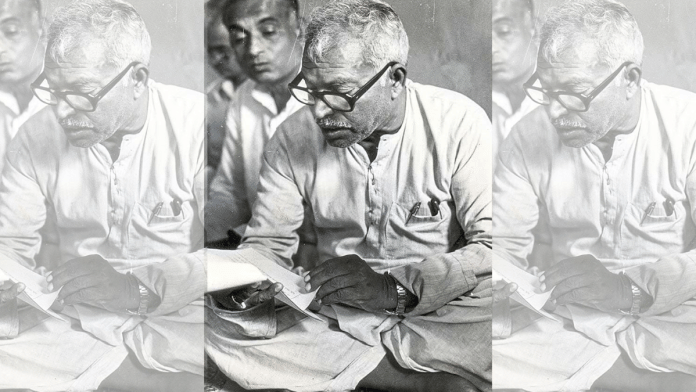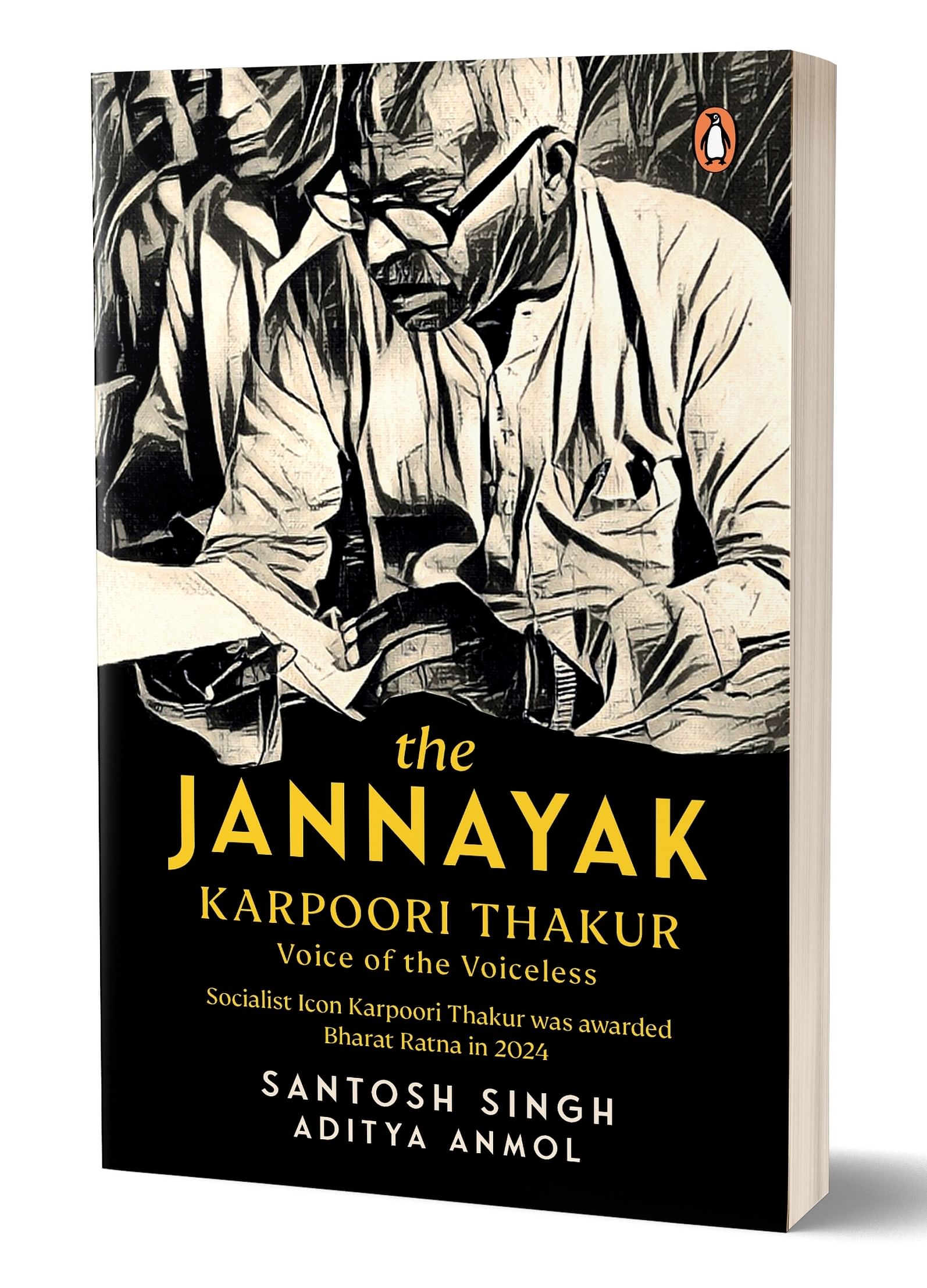Returning to Bihar, Karpoori sought an audience with CM Mahamaya Prasad Sinha and took two important decisions. The first was to remove the obligation of English as a mandatory subject in the tenth board examinations. The second was to exempt farmers cultivating less than 7 acres from paying rent for their land.
The bold move of eliminating English as a compulsory subject for passing matriculation startled both the government and the Opposition, sparking controversy. It was an incredibly courageous decision by any measure, with significant social implications. The ruling class and feudalists vehemently criticized the decision, branding it an assault on the education system.
Nonetheless, Karpoori staunchly defended his decision as the democratization of education. He contended that it was unnecessary to mandate the passing of a non-Indian language for matriculation, even if it was included in the curriculum. He also discovered that the requirement for English proficiency was a major obstacle for students from the Scheduled Castes, Extremely Backward Castes and Other Backward Classes and poor upper caste people in achieving success in the Class 10 board exams, colloquially known as matriculation.
Being labeled as a ‘non-matric’ was considered an insult and a stain on one’s reputation. Karpoori vehemently rejected the notion that he was a product of the Macaulay system. He believed that while learning English was valuable, it was not the sole priority. Instead, he supported Dr Lohia’s perspective of elevating the importance of one’s native language, be it Hindi or any other language spoken and written in the country.
During that era, individuals who had earned degrees or mastered the English language were held in high esteem, and people would go to great lengths to meet them. Speaking English was associated with prestige and supremacy, and it often elicited feelings of conceit and superiority. It mattered little what one actually spoke in English; the mere ability to speak the language was sufficient to be considered part of the elite. It was akin to holding a certificate of superiority.
I have also been regaled with tales by my father, Sanjay Prasad Singh, and my uncle, Mrityunjay Prasad Singh, who were both teachers from the 1970s until early 2000. They would often be hired to attend wedding parties to engage the wedding party in debates in English and were paid with a pair of dhoti-kurtas and Rs 51 each for outperforming the guests. My father used to recount how the visitors would ask a question in English, and if no one in the wedding party could answer it, it would be considered a triumph for the hosts.
The burden of English weighed heavy on many shoulders, regardless of their caste or creed. Upper-caste students too faced the same fate, as prospects of marriage and jobs seemed to abate for those who were ‘non-matric’. A job as a police constable or any modest opportunity for employment seemed unattainable for many just because they had faltered in their English examination.
Karpoori Thakur, the leader who dared to change the norm, took a brave decision, weathering many a storm because he believed in democratizing education by giving all students a fair chance, without discrimination.
With this bold move, Karpoori Thakur broke away from the colonial mindset that had placed too much emphasis on the English language at the expense of the native languages. Even today, the convent education system continues to prioritize English-medium schooling as its core, perpetuating a culture that glorifies English and demeans other Indian languages.
Karpoori Thakur’s decision challenged this dominant narrative and paved the way for a more inclusive and equitable education system that valued all languages and dialects spoken in the country. It was a decision that not only helped OBC and Dalit students, who were struggling to pass matriculation because of their lack of proficiency in English, but also benefited a large section of upper-caste students, especially girls who faced similar challenges. The bold step taken by Karpoori Thakur continues to inspire generations of students and educators to rethink the role of language in education and to work towards a more diverse and inclusive learning environment.
Jeffrey Witsoe writes, ‘Since Lohia held that caste status along with English education and wealth were three primary characteristics of India’s ruling classes, he believed that purely class-based socialism would not unseat the ruling classes, even with full public ownership over what Nehru referred to as the “commanding heights” of the economy.’
Dr Lohia believed that a true socialist movement in India needed to go beyond just political and economic revolution, and actively combat the deeply entrenched caste inequality in the country. He advocated inter-caste marriages and even proposed making them a prerequisite for public employment. According to him, socialism with a vested interest only focused on political and economic aspects and failed to address the social and cultural inequalities in India. He believed that the socialist movement needed to adapt to the unique conditions of India and take a comprehensive approach to achieve true equality and justice.
The decision to end the compulsion of passing in English in the Bihar board Class 10 examinations during the era (1967– 1972) of the ‘unstable governments’ was a significant achievement, given the prevailing English and elite mindset. Even though some parties supported it, they also suffered from this mentality. Dr Lohia had great faith in Karpoori and would often say, ‘If circumstances arise for Karpoori to leave Bihar, then within 10 years the Samajwadi Party’s organization should be established throughout the country, and it should form the government.’
Dr Lohia also wanted Bihar to be the laboratory of socialism, with Karpoori at its epicentre. Therefore, the main tool for social change and development was the focus on languages spoken and written in Bihar.
The authors of Bihar Me Samajik Parivartan Ke Kuchh Aayam, Prasanna Kumar Choudhary and Shrikant, note that Karpoori Thakur’s ‘English-not-mandatory’ policy and other socialist initiatives began to yield positive results. They speculate that ‘if Dr. Lohia had lived longer, he would have expanded its scope nationally. As time passed, the social composition of students in universities, including the elite Patna University, began to change. The number of rural students from backward castes also started to increase.’
Narendra Pathak, in his book, Karpoori Aur Samajwad, referred to it as an experiment in ‘indigenous socialism that created a strong attraction among the backward castes’. He argued that the ‘language policy of removing English as a mandatory subject helped student-youth and intellectuals of backward agricultural communities to connect emotionally with the socialists. Consequently, the social structure of students began to change in universities, even in the prestigious Patna University. The number of rural students from backward castes has increased in these universities over the years.’







